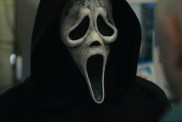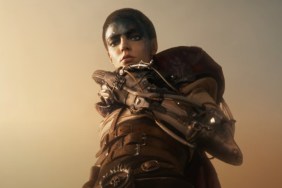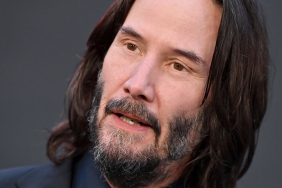Bringing a stageplay to the screen can be difficult, especially when it involves as much raw emotion and drama as John Cameron Mitchell and David Lindsay-Abaire’s Rabbit Hole, but having Nicole Kidman on board early as a producer and actor helped make that transition smoother. The film has rightfully received raves for the film’s stark emotions and the performances by Kidman and Aaron Eckhart as Becca and Howie Corbett, a suburban couple who lost their young son eight months prior.
As the film begins, the marriage starts to fall apart as the couple try to find closure, her by meeting with the teenager who accidentally killed their son, and him by hanging out with a married woman from their support group, played by Sandra Oh. Some of the strongest scenes involve Kidman with Dianne Wiest, as her mother who had to deal with the loss of her own child years earlier under different circumstances.
ComingSoon.net sat down with the director best known for the rock opera Hedwig and the Angry Inch (right) and the Pulitzer-winning screenwriter to talk about adapting the play to the screen, and we were pleasantly surprised by the calm composure of the soft-spoken Mitchell, who reminded us a little of another writer-director-actor with his demeanor… Clint Eastwood!
ComingSoon.net: I think when people find out you’re directing an adaptation of David’s play, they assume you saw the play and approached him to collaborate on it, but it didn’t come about that way, did it?
John Cameron Mitchell: I pushed him against the wall after the play.
David Lindsay-Abaire: If only that’s the way it happened.
Mitchell: No, we had met briefly but really didn’t know each other. I’d seen his plays, of course. If you’re in New York, you would because they were great moments in the theater, but I read the screenplay before I saw the play, which came across my desk because of my agent, and they were looking for somebody and I just fell head over heels in love with it. I reached out to the producer who I knew, which is Nicole’s partner, and he was excited by this idea, somewhat unexpected because my directing work was not exactly in the same style, but I guess he heard what I was saying about what I would do and how much I loved it. Then I talked to Nicole, and she kind of went on a hunch with that one conversation. Meanwhile, the three of them had been developing the screenplay.
CS: She was producing and developing it with plans to star in it.
Lindsay-Abaire: Yeah, that’s why she bought it.
CS: Were you already working on a screenplay at the time when the play was being performed on stage in 2006?
Lindsay-Abaire: No, I hadn’t even considered turning it into a screenplay until I was approached by Nicole and Per [Saari] and I thought, “Oh, is there even a screenplay in there?” Most plays don’t make very good movies.
Mitchell: I would have thought that a lot of people would have reached out.
Lindsay-Abaire: Not at all, no, quite the opposite. I think the subject matter is not the most commercial of subject matters so they weren’t really knocking down the doors. So lucky for me, a couple of incredibly smart people came… I probably wouldn’t have one it otherwise. I had no interest in turning it into a movie just to turn it into a movie, but because they said all the right things, I thought, “You know what? I think this might work out, fingers crossed.”
CS: Like you say, drama can sometimes be a tough sell. I know it’s hard to get financing for movies in general, but drama, unless they find a way to sell it like with stars–such as Nicole and Aaron–but it’s definitely harder especially when you’re dealing with the death of a child.
Mitchell: But why has that changed, I wonder? That was not necessarily a red light in the past.
CS: Oh, no. Back when Clint Eastwood did “Mystic River,” that took a long time to get going if I remember right.
Mitchell: But there’s always been… I just remember growing up with (those movies) so why do you think that’s changed?
CS: Money is tighter I guess.
Lindsay-Abaire: But I think the appetites have changed. I don’t know. People just want to see robots and special FX. That’s the myth, of course, we don’t want to see that. We want to see stories about humans interacting and people that share the same emotions and stories that we share.
Mitchell: I wonder.
CS: Nicole’s done quite a lot of drama and I guess having her behind it helped it get through and get going.
Mitchell: Oh, yeah, and it will help it be seen.
CS: Absolutely. When people know that a movie is based on a play, they expect certain things, obviously a lot of dialogue, and you guys did a good job breaking away from that, particularly the way it cuts to different scenes with different characters, something you can’t really do in a play at all. Was that something you developed while writing the screenplay or was that something you brought to it when you decided to make it into a movie?
Lindsay-Abaire: I think it was both. What the play had in its back pocket that most plays don’t have is that it had a relatively involved large off-stage life. There’s a lot of things that are talked about in the play, like the support group, like Howie’s work, the fact that Howie might have been having an affair was only hinted about in the play. The play takes place just in the house with the four family members and the boy, and they talk a lot about stuff that happens off-stage, so when it came to writing the screenplay, I thought, “Oh, I can go to all of those places and visit all those places” and it actually helped expand the canvas of the story. And then once John got his hands on it, it got bigger and leaner at the same time, and he made it much more cinematic than the screenplay even was.
CS: What kind of shape was the script in? Was there anything that you knew right away you’d want to try to build upon?
Mitchell: I thought it was beautifully structured already. It’s funny because it’s hard to… because I only saw the play on tape. I didn’t even read it, and I’m trying to remember if the comic book is in it at all.
Lindsay-Abaire: No, the boy has written a short story in the play so in trying to find a more visual counterpart, I made him a comic book artist, but you took that in a great way.
Mitchell: Well, the comic book stuff… and was the short story called “Rabbit Hole”?
Lindsay-Abaire: Mm-hm. The story was all the same. The story that he tells with the father, all that stuff is the same.
Mitchell: Well, I don’t know. I’ve never seen such a successful adaptation by the original writer, and he knew what was visual, he ran with it. I suggested some things to tighten the sister character, expand a bit on the… or move in a slightly different direction with the comic book stuff but it was all really tightly there. I think we might have moved one scene, the iPhone scene, earlier.
Lindsay-Abaire: Right, and then editing a couple things, too.
Mitchell: Yeah, tightening some stuff, paring away some dialogue and seeing if the image could do it without an extra word, so each word really hit when it was necessary. It’s lovely to hear people say, “Oh, I had no idea it was a play.”
Lindsay-Abaire: That’s my favorite (thing to hear).

CS: The first time I saw this in Toronto, I’m pretty sure I didn’t know it was a play.
Mitchell: And it is dialogue-driven, and people sometimes get scared of a dialogue-driven film, but to me, my favorite films are as well. How is “Network” not a play?
CS: I know you’ve been staying away from reviews but I know that when I watched it, I probably wouldn’t have realized it was from the director of “Shortbus” and “Hedwig.” Was it freeing being able to direct someone else’s writing and just be a director?
Mitchell: It was. You know, I’ve always been a writer-director and an actor since I was in high school, and I always loved the different roles. I like being a dramaturgic and there’s something relaxing about not having to come up with everything from scratch and just suggest a point-of-view to help someone else’s thing along. I love being an actor in other people’s work, though I kept changing my dialogue. (chuckles) I kept cutting my dialogue when I was an actor, which the directors were like, “I’ve never met an actor who wanted to cut his lines.” And then I also enjoy directing, and I also enjoy writing for other directors, which I haven’t done yet, but I’ve always wanted to. I’ve directed for the stage and I adapted a Tennessee Williams piece called “Kingdom of Earth,” which was really fun. It was almost like a dramaturgic job, because he always had millions of versions of his plays, and this was his greatest failure. It was called “The Seven Descents of Myrtle” originally and he went into a mental institution and checked himself in after it failed on Broadway and then rewrote it as “Kingdom of Earth” so I took all different versions and what was most interesting was the stage direction because they’re crazy and he babbles on and on about his own life in the stage directions, so I did an adaptation of his production in the mental institution like “This is the way it should have been” with him doing the lights and the sound and narration.
CS: When you wrote the original play, I assume you were able to workshop it with actors and get it right. Most screenwriters once they finish the script, they’ll had it to the director and they’ll do their thing or sometimes they’ll continue to be involved. What was the collaboration like on the movie vs. the play? And how much did you want to be involved?
Lindsay-Abaire: Oh, I wanted to be as involved as possible without getting in the way frankly, and when I first met with Per and Nicole, it was one of the things I said. I said, “Obviously, this will be the director’s project but I’d love to be around and my voice heard, not that you have to take my thoughts, but I’d like to at least be a part of the process, and they stayed to their word. I was part of the process the entire time and I met with John early on and stayed a part of it and hung out on the set, and didn’t pipe up too much. I was mostly hanging around with John, going around saying, “Look at the movie stars!” But John was so incredibly respectful of me and my process that I didn’t need to say anything. I never felt like, “Oh, they’re doing it wrong!” They always did it right, even when it was different, it was correct and organic and truthful.
Mitchell: Was there any time when you were on set when you were like, “Oh…” like you wanted to say something?
Lindsay-Abaire: Only one time.
CS: Tell us, tells us!
Lindsay-Abaire: No, no. I played it off, it was during the big scene.
Mitchell: The big erase scene, erasing the video.
Lindsay-Abaire: Yeah, and it wasn’t about how they were doing it, it was just…
Mitchell: Because that was a chaotic day.
Lindsay-Abaire: Yeah.
Mitchell: Very extreme day.
CS: Nicole and Aaron and Diane Wiest are all no-brainers, as at least Aaron and Diane have done a lot of theater, so lets talk about Miles, because he’s someone brand new. I remember when you did “Hedwig,” Michael Pitt was an unknown at the time and you kind of discovered him. How did you find Miles and know that you could put him with all these other actors and he’d hold his own?
Mitchell: I love discovering young actors because you can tell them what to do and you can say things to them like, “I’ve made you and I can destroy you.”
Lindsay-Abaire: (laughs)
Mitchell: And Miles was… he almost slipped through the cracks. We saw every young man on every coast including the Great Lakes coast. People sent in tapes from everywhere, because you do that when you have a young character that can’t necessarily be a star, and it’s very exciting when you’re the young actor. I remembered it happened to me when I was almost cast in “The Breakfast Club” and things like that. And crushed at the time… so happy it didn’t happen now. But he was at NYU, and a young manager or associate saw him in a workshop thing and just signed him on a hunch, so he had done nothing. He’d been in no movies, he’d done a walk-on in a TV show, so he wasn’t put to the forefront of “These are the people who we think are awesome,” he was one in millions, and I’m glad I looked at every little moment of the tapes, because…
CS: Did you give them scenes to perform on tape?
Mitchell: Yeah, they all did two key scenes and his scenes are so cogent and easy to tell if they can do it, if they can act it, but there was those eyes. He’s so young but those eyes have seen things, and seen heavy things. He just seemed like a real guy, there was nothing actor-ly about him, and I also liked that he isn’t super Hollywood pretty. He’s a handsome real guy that could be an odd outsider, he could be one of the jocks, you don’t know. And that was important, too. If you put some pretty boy in and said, “Oh, he’s such a loner, comic book guy…”

CS: I got the impression maybe he was a jock but then became a loner after the accident.
Mitchell: He could have been. He probably is the guy who did play football but didn’t talk to anybody. He couldn’t be more different in real life. He has experienced a lot of untoward drama in his life. He’s really happy-go-lucky, he’s an amazing dancer, he’s in the new “Footloose” in the Chris Penn role. He’s a brilliant dancer actually and very funny… but I can still destroy him… in one interview.
Lindsay-Abaire: I liked that there was one person on set that was a little greener than I was.
CS: I was curious how you approached rehearsal because it’s a little different when making a movie because Nicole doesn’t live here, Aaron’s always busy, so were you able to get all the actors together to any kind of rehearsal at all?
Mitchell: We had a couple days before, but with these kinds of virtuosos and this kind of intensity of emotion of scenes, you don’t want to over-rehearse, and it’s really more about talking basic… his back story, what’s happened since the accident…
Lindsay-Abaire: A lot of family stuff..
Mitchell: Yeah, family stuff…
Lindsay-Abaire: “How old is our brother? What do we make of our brother? What was our father like?” I remember I was doing that in rehearsal.
Mitchell: “Did you go to church? Did you go to school to escape your working class roots? What school might it have been?” Very basic things, but those actors had done their work.
CS: Nicole must have already known the script implicitly having developed it. So you did a little bit of rehearsal under your belt, and how long did it take to shoot it?
Mitchell: 28 days, the exact same schedule as both my other films, but in this case, from the beginning reading the script, I realized that my job was to remain invisible and be this invisible father figure in terms of camera style, in terms of making sure the actors were safe, in terms of… you don’t want to think about the director when you’re watching this film, so we didn’t have a lot of fancy camera moves, which also helps the acting, because fancy camera moves sometimes can burn out an actor because you have to do many takes. Using two cameras when we could on both actors, shooting all rehearsals. We never did a rehearsal without actually shooting it. There were all these tricks you learn over the years to help an actor connect more to the moment and a lot of it is technical. My producer suggested the Red camera for budgetary reasons, but for acting, it actually helps because you can roll for 40 minutes, which really helps an actor. Sometimes taking a break is not conducive to getting that performance.
CS: I have to say that this is beautifully directed, and while it is directed in a transparent way, the film is still very lush like something you might expect from Stephen Daldry or Todd Haynes. I had a question about the humor, because I know you come from a humor background, David…
Mitchell: (to David, jokingly) You did some stand-up?
Lindsay-Abaire: No, my plays are all comedies.
CS: You were able to bring some of that into the group therapy sessions, but how hard is that to bring some of that in and keep it light while knowing that you’re going to have to kill the audience with the emotions.
Lindsay-Abaire: Writing-wiseand a lot of humor came afterwards – I was just trying to tell the truth, and I feel like these characters were probably funny people before the accident and so the fact that this horrible thing happened didn’t change their worldview or their caustic perspective, particularly for Nicole’s character, and I just wrote characters speaking truthfully and hoped they would be funny, and then John did a lot more afterwards. The editing is incredibly funny. I think my favorite cut is when Aaron is getting stoned out in the car with Sandra Oh, and cut immediately to them staring… it’s one of the funniest moments. (Laughs)
Mitchell: It’s a relief for the audience, too.
Lindsay-Abaire: They need it so badly.
Mitchell: The little scenes that do have this humor are perfectly placed in the script to release the unbearable tension of this grief with one of the stage of grief is schtick and hilarity, laughing until you’re crying, which is what they do in that group scene. My other favorite funny scene, which is also painful, is when he’s trying to save the house, and Aaron ad-libbed a couple of lines there that… My God. He was like, “Would you like to see the master bedroom?”
CS: The actress who played the role of the real estate agent had some great silent reactions to his overeagerness.
Mitchell: Eli Wallach’s daughter was the realtor.
CS: Are you ever going to get back into acting yourself? I’ve always wondered when you might go back to that.
Mitchell: Someday. (to David) Why don’t you write me something?
Lindsay-Abaire: Alright, done.
Here’s some more stuff with Mrssrs. Mitchell and Lindsay-Abaire from the press conference that followed our interview:

Q: What got you interested in directing the movie?
Mitchell: I lost a brother when I was a teenager. He was the same age as the character in this film, and at the time there wasn’t a lot of grief counseling, processing therapy that was really part of the culture. We had religion, and it was about moving on and letting go before you were really ready to, so it was books and it was stories that helped me through that. I realized when I read David’s adaptation of his own play that it was some unfinished business for me to think about what had happened to me and maybe work through some stuff while working on this beautiful piece. It was really wonderful to work with these virtuoso actors because as they did their scenes I felt like I was in the scenes with them and feeling all the things they were feeling from behind camera, and it allowed me to release some stuff. Of course, that’s the point of work like this, that’s the point of art. The Greeks always told us to safely, vicariously live something so you don’t have to, or you’re ready to when it happens to you. So this was a very important experience for me.
Q: One of the things the movie deals with is finding comfort through faith and science, so were those ideas that really resonated with you?
Lindsay-Abaire: It certainly resonates with me. I probably share my main characters’ worldview. I’m a bit cynical and pragmatic and I personally have difficulty finding comfort through organized religion. For a character like Becca, more than religion she can’t find solace in her family or in support groups or in psychology or in psychotherapy. In trying to figure out where this character is going to find any kind of comfort, and I did want her to find comfort because whether she says so or not it’s the thing that she’s seeking, science just seemed literally the most logical place to find it. And yet, the thing that she finds in this scientific theory is a big hippy-dippy and odd, and so I liked that it sort of had this ethereal quality to it as well that you couldn’t quite pin down and grasp, and it still had qualities of something you might find in religion even though it’s based in science and fact.
Mitchell: I was really into comic books around the time that I was dealing with my brother and I liked the fantasy of somehow a heroic death giving meaning to the death. I was a big superhero fan; I loved the Legion of Superheroes, which was an alternate reality. I love that thing of in the same space is another reality, that’s how they would describe it. But the way David described it I’d never thought of it, which was this line that Miles has which is “If space is infinite everything is possible.” It’s not like an alternate reality it’s actually in the same reality in the same universe. If it’s infinite, eventually we’re here having a press conference and I’m saying something slightly different. Eventually a hundred monkeys will write “Hamlet,” if there’s enough time somewhere in the universe. It’s actually science; it’s not science-fiction, if you think of infinity. And there’s some kind of optimism in that, I don’t know why.
Q: Did you approach this differently than you normally would a stageplay?
Mitchell: With this kind of piece, because so many of the scenes are quite emotionally singular, you don’t want to over-rehearse. We had a couple of days when we could talk a little bit about the background, let Aaron and Nicole be in the same space so they can get used to each other’s body language as a couple. Nicole and Miles having a little bit of time just to be in the same space, but not really go into the scenes. We did a lot work, David and I, to kind of do little tiny adjustments with dialogue. He of course had been working on this for so many years, I added a little different objectivity to maybe what could be visual as opposed to verbal, but with these kind of professionals most of the work happens on set. I told them I’d fire them if they did any heavy acting in rehearsal, let’s just set where the cameras will be, and we shot every rehearsal so we didn’t lose that lightening in a bottle, which sometimes can happen in the first take. You get to know what the actors need very quickly, they tell you what they need, you know when to shut up and let them self correct in a way or come up with a variation in the next take. Other people will ask when they need help. Sometimes my favorite thing to ask Nicole was “Do you need me right now?” and she’d think about it and sometimes it would be “Let’s just keep rolling.” With Miles it was getting to know him, and him being less experienced was in some ways kind of exciting because he wanted me to talk to him more and we had a good time.
Q: How was the mood on-set in between all of the really emotional scenes you were filming?
Mitchell: I always feel when I’m doing something intense I want comedy. Aaron and I could have oddly a lot of laughs between scenes. For me, I needed that because as a director you sort of internalize all the scenes but you don’t have the release of actually saying the lines. So after their giant scene about “You’ve erased the video,” I had to go into the garden, lie on the grass, and just conduct all of that energy into the ground, literally to get it out. I remember talking to Todd Haynes and he was like “I’m really jealous of actors because they can relieve themselves of the emotions and release, and the director never gets to do that. Maybe when an audience is watching it for the first time you get to do that, but that’s the great grace of performing is you can release.
Q: Is there one thing you want people to walk away from this movie with?
Mitchell: I don’t think I would have wanted to make this film unless there was something about it that was forward thinking that gave you hope. The journey they go through is quite intense, punctuated because of David and the actors by great gales of humor and relief. There’s definitely a hydraulic letting things out in certain scenes. I love the scenes with Sandra and Aaron because Sandra’s character you sense the loss, it’s been eight years and she’s been able to find skills. Of course, she’s having her own trauma with her husband, but it’s such a breath of fresh air when their characters throw caution to the wind, get stoned in the car, go to the group meeting, go to the arcade; it’s like perfectly written, you need it at those points in the story. And oddly, the kind of gallows humor, which is also part of the process, is very necessary. But at the very end when Nicole’s character takes Aaron’s character’s hand, that was absolutely necessary just for me to be able to say “I want to direct this.” If she hadn’t I don’t know if I’d want to do it because they’d been through so much and you sense that they’re going to make it, and they’re going to make it not in a fake Hollywood way but in a complex, true way. We want this film to be a tool for everyone in order to deal with loss to live their life. That’s what these stories are for.
Rabbit Hole opens in select cities on Friday and nationwide on January, January 14.









